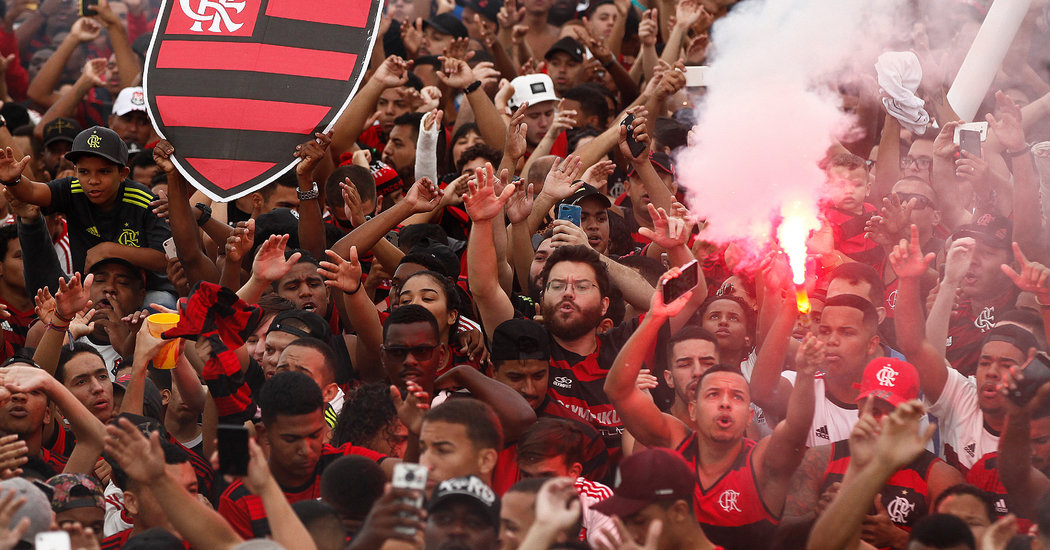
www.nytimes.com
Can South America Produce a Superclub?
Flamengo, which faces River Plate in Saturday’s Copa Libertadores final, might be the best bet. But can it break through in a Eurocentric soccer world?
Sports
My favorite soccer-related study of all time, by some distance, came from the Brazilian magazine Mundo Estranho a few weeks before the start of the 2014 World Cup.
For the first time, it said, it could provide an answer to that thorny question: Just which team is the most popular in all of soccer? This, you will agree, is the sort of research that matters, the sort of material that academics and statisticians all over the world should be devoting their time to understanding.
It does, after all, have real-world effects: Manchester United, for one, regularly mentions on conference calls to its investors just how many fans it has. The latest estimate, from the agency Kantar, is that 1.1 billion people — or one in every seven people on the entire planet — are currently trying to persuade themselves that seventh in the Premier League isn’t too bad.
Mundo Estranho’s work, then, had the potential to be extremely important. It had, it said, tasked polling companies in 10 countries — from the Netherlands to Japan — with analyzing data to provide a conclusive answer.
The conclusion was, perhaps, a little surprising. You might have thought that United would at least be in contention, what with a seventh of the global population being so keen on Ashley Young’s adventures, but it did not even make the top 10.
Neither did Barcelona. Real Madrid came in ninth. Juventus was the highest-ranked European team, but even a club that claims to have the backing of half of Italy could finish only sixth.
Top of the pile, it turned out, was Flamengo, the Rio de Janeiro giant, just ahead of two Mexican clubs: Chivas Guadalajara and Club América. Flamengo could, the magazine discovered, count on 32.6 million fans around the globe.
If that seems a little low, you should probably consider the survey’s criteria: for reasons that were never really explained but that are quite obvious when you think about it, Mundo Estranho decided “Chinese fans who support Manchester United” did not count.
The science may have been a little off, but the message is still worth considering. Soccer has become so Eurocentric in the last two decades that it is easy to regard Brazilian teams as nothing but feeder clubs: talent production lines, mining operations to provide the elite of the Premier League and La Liga with superstars-in-waiting (and also holding midfielders).
It is easy to forget that they are, in and of themselves, vast, historic, social institutions that until comparatively recently could match most European clubs for glamour and prestige and even wealth. Flamengo is not the richest team in Brazil or the most successful, but it is, as Mundo Estranho suggested, probably the most beloved.
That was why thousands of Flamengo fans gathered at Rio de Janeiro’s airport this week to watch their team depart for Lima, Peru, and the final of the Copa Libertadores. It is why all 32.6 million of its supporters will tune in on Saturday to see if Flamengo can topple River Plate, the reigning South American club champion, and lift the trophy for the first time since 1981.
It would be fitting if it was to do so. This is the first time that the Libertadores has been decided by a single, Champions League-style final — it has traditionally been held over two legs — as CONMEBOL, South America’s governing body, tries to stage a showpiece to rival Europe’s better-known (and far richer) club championship.
It is, as Alejandro Dominguez, the CONMEBOL president, told me last year, an attempt to blend South American authenticity with European organization. So, too, is Flamengo. Its manager is Portuguese, the former Benfica and Sporting Lisbon coach Jorge Jesus; his rapid transformation of a team that had been struggling has been down, in no small part, to introducing European tactical ideas and training facility innovation. Victory would make him only the second European coach to win the Libertadores, after the Croat Mirko Jozic.
Flamengo, like many of its peers and rivals in Brazil, is searching for a way to stanch the talent drain to Europe, if not to close the gap — as Dominguez put it — then at least to prevent it from widening. Like Palmeiras, São Paulo and a handful of others, it has ambitions to become the first true superclub outside Europe.
Its popularity is a good start. So, too, is its adopting of some elite practices from Europe. But it cannot stop at the surface. Much of the work has to be away from the limelight. As the death of 10 young players at Flamengo’s youth academy earlier this year highlighted, Brazil’s clubs have not always prioritized the health and safety of their young charges. If Flamengo and its rivals want to be a place to go, and not just somewhere players come from, it must not think only about the rewards, but its responsibilities, too.
New York Times
Tags: New York Times, NY Times, Flamengo, Brasil, Soccer, South America
























































